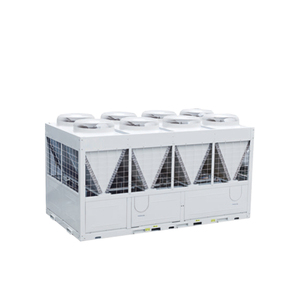(554 products available)











































































































































































































A chiller is a piece of machinery used to cool something, typically a liquid. Basically, chillers are heat-extraction devices that are used to remove heat from a liquid through a vapor-compression or absorption refrigeration cycle. 120kw chillers are industrial cooling machines used to remove heat from a process. These types of chillers usually come in two main categories: air-cooled 120kw chillers and water-cooled 120kw chillers.
Air-cooled 120kw chiller
Using ambient air as the cooling medium, the heat generated during the refrigeration cycle is expelled into the air. 120kw air-cooled chillers come in various forms and may use axial or radial fans, and they are usually placed outside of buildings.
Water-cooled 120kw chiller
A water-cooled chiller uses water as the medium that absorbs heat. Usually, a secondary or evaporative water system is employed. 120kw water-cooled chillers are usually installed indoors, however, they require a separate cooling tower or water heat sink.
The following are key specs for business owners to pay attention to when purchasing a large-scale chiller.
Business owners should consider regular service and maintenance. This is important for the optimal performance, reliability, and longevity of the large-scale chiller. Here are some tips for 120kw chiller maintenance:
These large capacity chillers can be used in the following industries and applications:
There are several things to note before purchasing an industrial chiller. This includes the working environment and business parameters. Let's discuss these factors in detail:
Cooling Load Requirement
/Size of the business: It is important to evaluate the level at which heat is generated within the building or facility. This includes the impact of weather changes, insulation, the number of people in the building, and other factors that affect the occurrence of cooling needs and the amount of cooling needed. Understanding these things will help determine the appropriate chiller capacity, like a 120kw water chiller.
Chiller System Types
There are various types of chillers, including air-cooled and water-cooled, reciprocating, screw, absorption, centrifugal chillers, etc. Each has distinct features, working principles, advantages, and shortcomings. For example, a water-cooled chiller works better in a high-heat situation because it can dissipate heat quickly. On the other hand, water-cooled chillers require a cooling tower and water for heat rejection. This makes them unsuitable for areas with limited water resources. An in-depth understanding of these systems will help to pick the right chiller that will satisfy the requirements of an application.
Energy Efficiency
Because industrial chillers consume a lot of energy, it's important to select a chiller system with an effective energy use ratio (EER) or coefficient of performance (COP). These two parameters indicate a chiller's cooling output per watt of energy used. A chiller with a high EER/COP is energy-efficient and will help reduce electricity bills.
Environmental Impact
Since industrial chillers contribute significantly to a business's energy usage, choosing a chiller with a low global warming potential (GWP) refrigerant is essential. Refrigerants with a high GWP can significantly impact climate change when they leak into the atmosphere.
Installation, Operation, Maintenance, and Service Support
Operating and maintaining a chiller will cost a business more than the initial investment. Therefore, it is important to consider the costs of these two factors. Choose chillers that are easy to maintain, operate, and install, and settle for a manufacturer that provides excellent after-sales support.
Q1: How is the performance of a 120kw chiller measured?
A1: The performance of a 120kw chiller is typically measured by its cooling capacity, which is the amount of heat it can remove from a space or process per unit of time. Cooling capacity is usually expressed in kilowatts (kW) or tons.
Q2: What are some environmental considerations associated with 120kw chillers?
A2: When selecting a chiller for use, both the refrigerant it uses and the chiller's energy efficiency need to be evaluated thoroughly. This is because they directly affect the environment. It is preferable to choose a chiller that uses a refrigerant with a low global warming potential (GWP) and to opt for highly energy-efficient chillers to minimize greenhouse gas emissions resulting from energy production.
Q3: What are the differences between air-cooled and water-cooled 120kw chillers?
A3: In general, an air-cooled chiller is more suitable for small to medium-sized applications or when the installation site has limited space. Conversely, a water-cooled chiller is more suitable for large-scale facilities or applications that require high cooling capacities.